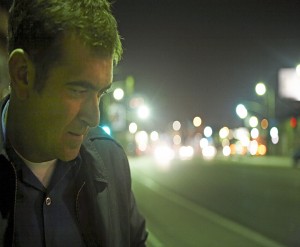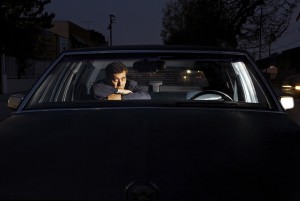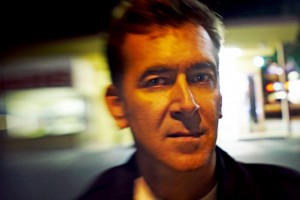 What is the difference between Tommy Keene and the most famous singing guitar-slingers of the past couple of generations?
What is the difference between Tommy Keene and the most famous singing guitar-slingers of the past couple of generations?
Tommy Keene has never had a “My Sharona,” or a “Cruel To Be Kind.”
Sure, he’s written and recorded so many gems, his guitar cases are lined with semi-precious glitter — but the power-pop singer/songwriter’s storied career has never crossed paths with the exact sort of juju, with the mystical twists of fate that put an artist into millions of living rooms.
Not that he hasn’t had some brushes with fame.
In 1984, Keene and his backing band countered their jingle-jangle, Athens and Tobacco Road contemporaries with an EP that was chock-full of an equally distinctive pop sound, a sound that was the result of playing the Maryland and greater D.C. area for years. On the strength of Places That Are Gone, Keene was an instant critics’ darling; later, while under the very questionable wing of a major label, he failed to rise to the heights expected of someone with such talent. Despite a couple of solid Geffen albums, by the mid-90s Keene’s status as a musician with a “cult following” had seemingly been cemented.
Not that there’s anything wrong with cult followings, especially when much of one’s cult is comprised of other musicians. Alex Chilton never had his face on a lunch box. However, every musician wants to be heard by as many people as possible, and Tommy Keene is no exception. Indeed, it must be tiring for Keene to read article after article that begins with the “coulda – shoulda” theme. But as much as journalists may hesitate to do down the road that so many have gone before, the fact remains that the notion of “tireless underdog” has become part of Keene’s persona, part of his appeal.
Indeed, some thirty years into his recording career, Keene remains an underdog — one of those artists whose CDs are regarded as semi-private treasures by their fans. One of those musicians whose admirers, with each new album, clamor for great success and validation while secretly half-hoping that their hero remains on a certain radar level. Indeed, there’s a third edge to the dog-eat-dog entertainment business’ sword: a challenging, yet sometimes greener-grassed region occupied by tireless, talented underdogs.
It’s a bit too early in the season to tell if fate’s fickle winds are finally blowing in the right direction, but at the very least, more fans will be brought into the fold with his latest effort, Behind The Parade (Second Motion Records). Featuring a single that’s as catchy-addictive as any you’ll find (“Deep Six Saturday“), the album, like most before it, is pure Keene: filler-free, with lyrical and six-string hooks galore; grand, punchy and cheery in all the appropriate moments, wistful and contemplative at all the right times. And, like most before it, the record proves to be timeless – 1979, 1984, 2012 and 1966 all seem to simultaneously echo from Keene’s instantly recognizable pipes and magnificent guitar.
East Portland Blog recently spoke to Keene via phone in L.A. as he began preparations for a brief West Coast Tour. It soon became apparent that, despite an expected level of wariness regarding the music business, rock ‘n’ roll has kept him quite young, with an undiminished sense of humor. And, in the tradition of the best underdogs, Keene keeps it real — with fans and prodding journalists alike. An interview with Tommy Keene is akin to two teenagers chatting in a record store while flipping through vinyl.
EPB: What a cool new video, for “Deep Six Saturday.” It’s been a while since you’ve made one, hasn’t it?
Keene: Not since ’96. It’s funny, how things keep getting cheaper and cheaper, but it’s still so hard to “break through.” I remember when we did a very low-budget video for a song called “Turning On Blue,” it was like three or four thousand — which in those days, was nothing. My first video for Geffen, for “Places That Are Gone,” cost $68,000 — and at that time, it was cheap. People were spending hundreds of thousands of dollars. Do you know much the new video cost me to make?
EPB: A hundred bucks?
 Keene: About! I had to buy beer and sandwiches for the 30 or so people in the video, we had a party. The guy who made it, Chris Rady, is a photographer who shot the last couple of record covers for me… it was fun, it’s a fun video.
Keene: About! I had to buy beer and sandwiches for the 30 or so people in the video, we had a party. The guy who made it, Chris Rady, is a photographer who shot the last couple of record covers for me… it was fun, it’s a fun video.
EPB: Who played your “Wolfred”?
Keene: Oh, that’s my friend Matt – he’s kind of a ham, as you can see. Chris said, “I have this bear suit!” and it’s not really a bear suit — people are going, “Is that a dog, a bear, what?”
EPB: Great choice of car.
Keene: That came from a friend of Chris’. And it’s the same Cadillac I’m sitting in on the album cover… I should’ve had a chauffeur’s uniform on, it would have been like the cover of the second Roxy Music album. Of course, I love Roxy Music to death…
EPB: I didn’t know that, wow.
Keene: Yeah, they’re one of my “Top Ten” bands — for their first five albums, at least. Did you ever see them back in the day?
EPB: Noooo… a shade too young for that.
Keene: I did. I once did a “guest editor” gig… for a “favorite concert experience” article, I wrote about the Siren tour. I saw that when I was about a sophomore in high school.
EPB: Exactly what about Roxy Music do you appreciate?
Keene: Everything. Do you ask because it’s so different from my music, or something?
EPB: Well, yeah.
Keene: I know what you mean… it’s great pop-art rock music. I love the whole idea of the band. By Avalon, they’d turned into this sort of “respectable band”… I mean, that’s a good record, but to me, the early stuff was so mind-blowing. Bryan Ferry‘s voice was amazing. I remember the first time I heard it, I thought he sounded like Dracula or something (laughs).
You know, on The Places That Are Gone ep, we did a live version of “All I Want Is You,” which is such a great pop song.
 EPB: Do you like other prog/art-rock bands from that era?
EPB: Do you like other prog/art-rock bands from that era?
Keene: Oh, I love ELP and Yes. It’s funny, the only other person I know who will admit to liking ELP is Bob Pollard.
EPB: I recently saw a London prog-rock festival on cable… Emerson, Lake & Palmer came out and blew everyone away.
Keene: Isn’t it weird that no one plays like that anymore? All of those guys were prodigies. Now, everyone seems to accentuate the “amateur-ness” of their craft. Some of these indie-rock bands…
EPB: Considering your varied, numerous influences, how did you develop your signature guitar sound?
Keene: My guitar playing really has dictated my whole career, and (the guitar) is the basis of my songwriting. I’ve been playing in bands since I was eleven – a long time. Funny, a critic from D.C. once called me a “Bethesda, Maryland folk rocker.” I do have one foot in that, but I also have the other foot in “loud.” I think my style is basically a folk-rock style turned up. I have sort of a rhythm approach to it, though I can wank out a solo… it’s not original, but it also does sound like me – people can tell it’s Tommy Keene playing. Which is a good thing, I think.
EPB: This new CD was recorded at your house, another DIY venture. Who can you count on to tell you when something’s wrong, or right?
Keene: Me (laughs).
EPB: That’s a lot of self-discipline.
Keene: If a band member or a musician is around… I love to bounce ideas off people; I’m not a Prince-type guy who has to do everything himself. When you get other people’s personalities into the mix, especially as a solo artist, that’s when it gets interesting.
From a technical point of view… Walt Vincent has mixed the last few records, and kind of co-produced. It’s the kind of situation where if I need advice or he feels that something’s glaringly wrong, he’ll speak up. He’s the perfect foil for bouncing ideas.
It’s funny, back in the days of Geffen… we had recorded these 8-track demos in a friend’s basement studio, trying to get a major-label deal. They became Places That Are Gone, and that lit up everything, got great reviews… A&R people came calling, and we signed to Geffen. And their whole mindset was, “Now you need to find a producer.”
We wound up going down to Montserrat with Geoff Emerick, who had engineered Sgt. Pepper’s and produced Elvis Costello‘s Imperial Bedroom… I was in love with that album. But it didn’t work out that well, in the long run. The lesson I came away with it was, “Don’t get your ‘dream producer’ because he did your favorite album; get anyone — the guy down the street, whomever — who can get what you’re trying to do down on tape.”
They should have left me, left us alone. That’s the irony of it – we were on the right course the whole time, and Geffen totally derailed us.
The budget for that first Geffen record was something like $175,000. I remember the A&R guy saying, “I’ve never made a record for less than this that was any good.” Their whole idea was, “If we spend a lot of money, we must be doing something right, and it’ll turn out really well.”
Why are the big labels gone? That’s why.
EPB: When you moved to Los Angeles, were you escaping something, or running to somewhere?
 Keene: Yes, the first part. I was “big fish-little pond,” and there was a bit of a backlash after Songs From The Film. Everyone in Washington hated it, they thought it was over-produced and too slick; the age-old, “they took an independent artist and ruined him” kind of thing. And the record, to me, does sound dated now – and the stuff we did in the basement doesn’t sound dated.
Keene: Yes, the first part. I was “big fish-little pond,” and there was a bit of a backlash after Songs From The Film. Everyone in Washington hated it, they thought it was over-produced and too slick; the age-old, “they took an independent artist and ruined him” kind of thing. And the record, to me, does sound dated now – and the stuff we did in the basement doesn’t sound dated.
I was kinda tired of the D.C. scene, and I had taken some hits in the press. The label wanted me out here, probably to manipulate me a bit more. They gave me money to move out here, and I had a manager and booking agent.
I’d had a fascination with the West Coast since I was a kid. My dad was a marketing guy for a company that made planes, and had contracts with the Defense Department. One of their big plants was in Riverside. So, starting when I was about four or five, my dad would take my older brother and I on these trips to California. Coming to Southern California in the late Sixties was a mind-blower.
So, when the record company asked me to come out to L.A. in ’88, I couldn’t resist. And when I got here, I kind of disappeared… In D.C., I was a big local act, and we would play all the time. In L.A., I didn’t want to do that “play somewhere in town once a month” thing. I’d go out on tour when I had a new album… it was a completely different scene.
EPB: Do you get fidgety if you haven’t been on the road in awhile?
Keene: Yeah, but I combat that with practice… I can’t just go out and play a show. I’ll sing for 20 minutes one day, 30 the next. You’ve got to get in shape to get in the game – to sing an hour-plus, jump around and get sweaty… it’s like being an athlete, you’ve got to condition yourself.
EPB: Portland’s exploded, publicity wise, since you last played the Northwest.
Keene: Right, Portlandia. I was up there in ’08, rehearsing for a tour with Bob Pollard. A couple of guys (in that band) lived in Portland, so we hung out, checked out the Doug Fir Lounge. Pretty cool. The drummer was a friend of mine, John Moen; he plays in the Decemberists.
It’s a very attractive city; when I think of places I’d go if I wanted to move out of L.A…. I think, “Austin? No – too many bands.” Portland seems like a nice, liberal city, if you don’t mind the weather.
EPB: You haven’t played Seattle in a while, either.
Keene: No… I thought it would be a good idea to get up there and see what I’ve been missing — and to try to keep this record going. I don’t know, every time I put out a new record, I get all excited, and then there’s that moment when you realize, “Oh, it’s over.” When this record, especially with “Deep Six Saturday,” in my optimistic viewpoint, I kind of expected something to happen. The reviews have all been very positive, but nothing has happened yet, I’m not on The Tonight Show tomorrow night…
EPB: Why aren’t you?
Keene: Oh, I don’t know. I asked my publicist about TV, and he said it’s very tough right now, there’s a million people vying to get one of those slots – Conan, Jimmy Fallon, whatever. He said they’re looking for “youth” and “sizzle.”
So I turn on the TV one night, and who’s on? Guided By Voices. “Youth,” and “sizzle.” (laughs)
EPB: Critics have labeled Behind The Parade as a typical, and typically great “Tommy Keene record.” As I was listening to the album’s all-keyboard track, “La Castana,” I wondered if you have ever considered making a record that is… less recognizable — an acoustic record or something?
Keene: Yes, yes, yes. And this kinda ties into the Roxy Music thing. I would like to do something different, more atmospheric, more experimental – it’s a part of me that’s a little untapped. There was a song on the last record, an instrumental called “Elevated.” It was basically a guitar-raga, psychedelic, Tom Verlaine-esque workout. What I’m talking about is moving away, a bit, from the “big power-pop, big vocals” and just say fuck it, let’s do something really interesting… to me.
But then I think, “Why would somebody want to hear that from Tommy Keene? People buy a Tommy Keene record because they know what they’re getting.” It’s kind of pretentious… somebody like Elvis Costello can make a dozen great pop-rock records and then say, “Oh, I want to go to Nashville and make a country record” or “I wanna record with the Liverpool Philharmonic, and go to New Orleans and make a record with Allen Toussaint.” And it’s accepted, encouraged to do so, to expand.
(The idea) has always intrigued me, but I’ve also felt that, for me and at my stage in the game, it might be like, “Hey, notice me, I’m trying to do something different!”
But I keep threatening to do it, anyway. Before I make another pop-rock album, I’m going to do something a little bit more experimental, off-the-wall… arty, for lack of a better word. Some people think I’m entrenched as a Sixties-inspired, pop-rock songwriter, but I’m really not.
EPB: Hey, I’ve got an idea. Why don’t you record another four songs’ worth of the power-pop people want to hear, and then tack the EP onto the end of this album you want to make. That way, they’d be forced to wade through it to get what they’re after.
Keene: (Chuckling) Hey, it wouldn’t be that different, that far out… it wouldn’t be like Van der Graaf Generator or something! I’m not gonna write another “Metal Machine Music.”
“Deep Six Saturday video –


